Landus’ big move was “bold” (and awkward)
Our sympathies to the 60 or so employees who were terminated in cutbacks. The layoffs, “done virtually,” were indeed “a little jarring” – all across the Farm Belt.
RALSTON, Iowa – To the growing list of major corporations, especially ag-related ones, recently announcing layoffs and cutbacks, we now add Landus Cooperative.
On Friday, the Des Moines-based company, the state’s largest co-op with roots stretching back 136 years to solo grain elevators in tiny farm towns, shut down normal operations at all but one of its more than 70 locations in Iowa and southern Minnesota.
Then during the morning, CEO Matt Carstens led a company-wide meeting online to announce the immediate layoff of “less than 10 percent” of its total workforce of about 600 employees – or about 60 people.
The layoffs, chief of staff Stephanie Copley explained to me later in the day, were immediate, permanent and “at all levels” of the corporation.
“We did it virtually,” she said, about the online delivery of the news to all employees. “We knew it would be a little jarring.
“But one of our struggles with having locations all across the state is that it’s hard to get a message out so that everybody hears it at the same time. By doing it virtually, everybody was able to hear the same message from Matt. And everybody could hear him answer questions at the same time.”
There were no lines on Friday at the sprawling Landus Cooperative facilities in little Ralston in west central Iowa.
First media reports, I think, were from WHO-TV in Des Moines, which had an online story quoting a “company spokesperson” that the layoffs are “not an easy decision” that reflects a “bold strategy” by the company. That strategy is “to become the ag retailer of the future. As we have seen with many companies across the U.S., we needed to make changes in both our personnel and our structure to better support our farmer-owners and accomplish this bold strategy, which unfortunately means saying goodbye to some colleagues.”
Copley told me later in the day that Landus “wants to grow quickly and be more efficient in 2025.”
The company spokesman had also told WHO-TV that “rumors about a buyout of the company are not true.”
Well! Let me tell you, there wasn’t just one rumor!
When all of this was trickling out to the public Friday morning, I was sitting with three tables of our “Bean Boyz” coffee group at Greene Bean Coffee in Jefferson, which is a real Landus town. We’ve personally known the executives, employees and farmer-owners of all the ag cooperatives across our area. We’ve watched them for decades as they’ve mostly grown, prospered and merged. We were, of course, concerned.
So, we were all checking our cell phones, making and taking calls.
First unreliable flash: “Landus is belly-up!” Untrue.
We were also hearing the false “buyout of the company” rumor. The buyer was said to be “a large co-op in Minnesota,” and we were speculating which huge operation that might be.
And we were hearing that CEO Carstens had been, or was being, fired – and that “security walked him out of the offices.” That one is false, too, Copley said late Friday afternoon. “Matt Carstens is still with the company, is still the CEO, and it’s business as usual going forward,” she said.
But there were these facts feeding the frenzy:
--On Thursday morning, the Des Moines Register had posted a story online from the esteemed international news service Reuters, reporting that farmers across the Midwest were rapidly increasing their sales of grain – especially corn – from storage because prices from purchasers had spiked. Corn prices were up 10 percent in the past month, Reuters said, reaching the highest levels in more than a year. That was reflecting a report days earlier from the U.S. Department of Agriculture that the 2024 harvest wasn’t quite as robust as it had reported earlier. That story contained this: “Iowa-based Landus, one of the largest U.S. grain cooperatives, on Monday (Jan. 20) will urge farmer customers to sell, CEO Matt Carstens said. ‘We're looking at tariffs and the loss of the China market,’ Carstens said. ‘Right now, you just don't know what the demand side is going to look like this year.’ ” Did that statement strike anybody else as an oddly political one by an ag co-op CEO right before presidential Inauguration Day?
--Late Thursday night or early Friday morning, the Landus website added this notice across its top: “All locations closed Jan 17, except Ralston. For business needs, call 515-800-4769.”
Saying “Ralston” among people who know ag cooperatives is like saying “Cooperstown” to those who know baseball.
One of the old headquarters buildings in Ralston.
That town on the border of Greene and Carroll Counties is just 15 miles west of Jefferson. So, Friday afternoon, I made my first visit in years.
It is a place – no kidding here – where First Street is the south edge of town and Third Street is the north edge.
The problem I ran into was that there was almost nobody for me to talk to. Well, that’s not quite accurate. I walked into the office that Landus Cooperative still has here – a nice mostly-empty contemporary brick building – and there were 8 or 10 people sitting in lounge chairs in the big reception area. They appeared to be having a meeting I interrupted.
“Can I help you?” a tall fellow wearing a “Landus” fleece, said.
“I’m Chuck Offenburger, and I’m a reporter,” I said. “I’d like to talk to someone about what’s going on with your company.”
That pretty well ended the conversation.
The tall fellow, speaking for the group but refusing to give me his name, said no one there could make any comment. He added that I’d have to “talk to somebody at company headquarters in downtown Des Moines.” He did authorize one of the other employees to give me the right phone number to use.
From stopping at a glass-covered display board where Ralston City Council agendas and minutes are posted, I learned that the Mayor is Curt Hike. I dropped by his house, but missed him and left a card on his door. We connected by phone an hour later.
Downtown Ralston on Friday early afternoon.
So, how’s Ralston?
“Well, we have been able to keep our heads above water, I guess,” Mayor Hike said.
“There aren’t many of us left. The Census has us at 78, but I don’t know where they’re finding all of them. If you ask me personally, I count more like 6o, maybe 65.”
He remembers “back in the ’70s, when I was a kid, the population was more like 130 to 140. Of course, back then West Central (the cooperative that became part of Landus in the 2016 merger) was the largest co-op in the world.”
It probably seemed like that to a kid, but actually, the company wasn’t quite that large then. But it was the largest in Iowa, and one of the 100 largest in the U.S.
The mayor said Landus in Ralston today is only a shadow of what it once was. “They’ve torn down a lot of their old buildings here in the last couple of years,” Hike said, “and they’ve sold a lot of their properties here.”
It was quite a story. In 1907, local farmers first organized the “Farmers Elevator Company.” It did fine until the economic collapse of 1929, and then was soon bankrupt. A new co-op was organized in 1933, “The Farmers Co-operative Association of Ralston,”
From the 1950s through the 1970s, the company grew rapidly – right in Ralston. The original CEO Karl Nolin retired, succeeded by Wayne Seaman and Tom Feldman. The co-op became nationally famous for its length “grain trains,” featuring the grain gondola cars. Again, no kidding here, those gondola cars were painted pink so they’d be easier to locate for return to Ralston. In 1978, the company changed names to West Central Cooperative, with headquarters remaining in Ralston.
That restaurant on the left, as I remember, was owned by West Central Cooperative and leased to a restaurateur. The co-op’s executives and employees kept it busy for years.
Growth and diversification of services helped the company survive the Farm Crisis years of the 1980s. Then West Central’s visionary leap in the mid to late 1990s into the production and marketing of “renewable fuels” spurred even more growth. Their fuels focus became “biodiesel,” also called “soy diesel,” made from soybeans. Construction of huge new processing facilities – a refinery, actually – was started in Ralston. It was the first biodiesel production plant in Iowa, and one of the first in the nation.
In 1999, a new CEO Jeff Stroburg took over, and in 2003, he led creation of a new subsidiary, “Renewable Energy Group,” or “REG.” It quickly became the nation’s largest marketer of biodiesel fuel.
In 2007, REG moved its offices and most of its labs to Ames, and the pace of business activity in little Ralston started to decline.
Stroburg took over leadership of REG, and in 2015 West Central had a new CEO, Milan Kucerak, who was elevated after joining the company in 2006. In 2016, Kucerak presided over West Central’s merger with a cooperative of about the same size, the Farmers Cooperative Company, based in little Farnhamville, about 25 miles northeast of Ralston.
After that merger, the new company “Landus” briefly maintained executive offices in both Ralston and Farnhamville but soon moved their combined headquarters to Ames.
Matt Carstens became Landus CEO in 2020, and in 2022, the corporate headquarters moved to downtown Des Moines, locating in a new building on Southwest Ninth Street, and along Martin Luther King Jr. Parkway on the south side of the business district.
In June 2022, the huge American energy company Chevron bought REG for a reported $3.15 billion.
Get this: In March 2024, Chevron announced it was closing the biodiesel plant in Ralston because of “unfavorable market conditions.” That plant had undergone a $32 million expansion in 2018.
Where the Ralston City Council’s agendas and minutes are posted for the public.
And Ralston?
Mayor Hike said Friday “I think the biodiesel operation may still have two employees here, but I’m not sure about that.”
Landus continues to receive soybeans at its processing facilities here, where they’re processed into soybean meal or diet supplements for livestock – primarily dairy cattle. Those operations are known as “SoyChlor” and “SoyPlus.”
“During harvest last fall,” the mayor said, “they had so few employees here that farmers had to unload their own soybeans.”
And on Friday, it was the only one of an ag conglomerate’s 70 locations that was open.
It’s quiet in Ralston. Real quiet.
--
You can comment on this column below or write the columnist directly by email at chuck@offenburger.com.
--
The Iowa Writers’ Collaborative Roster
Please explore our growing roster, pick those you wish to follow, and become a paid subscriber. Your support sustains this group.


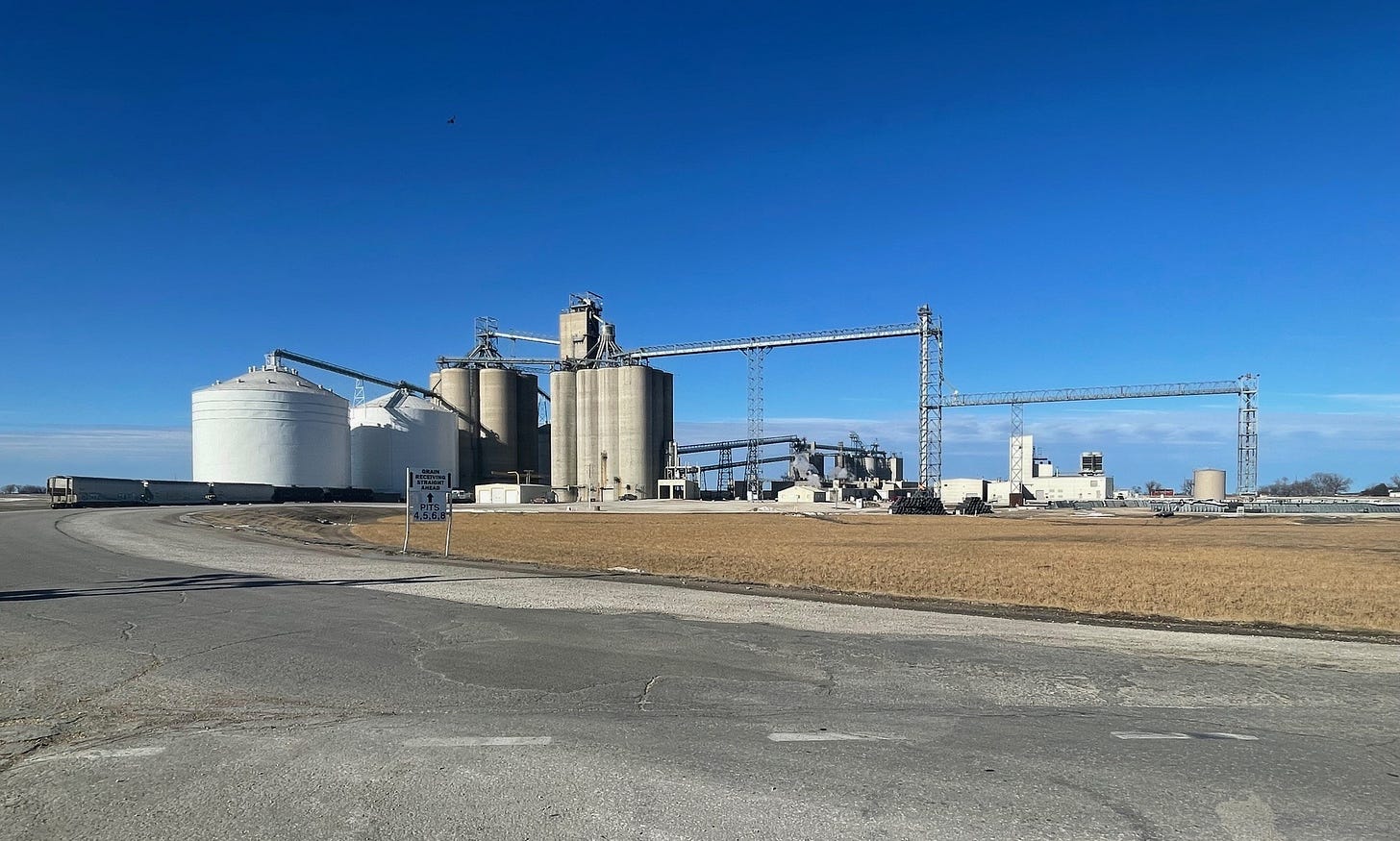
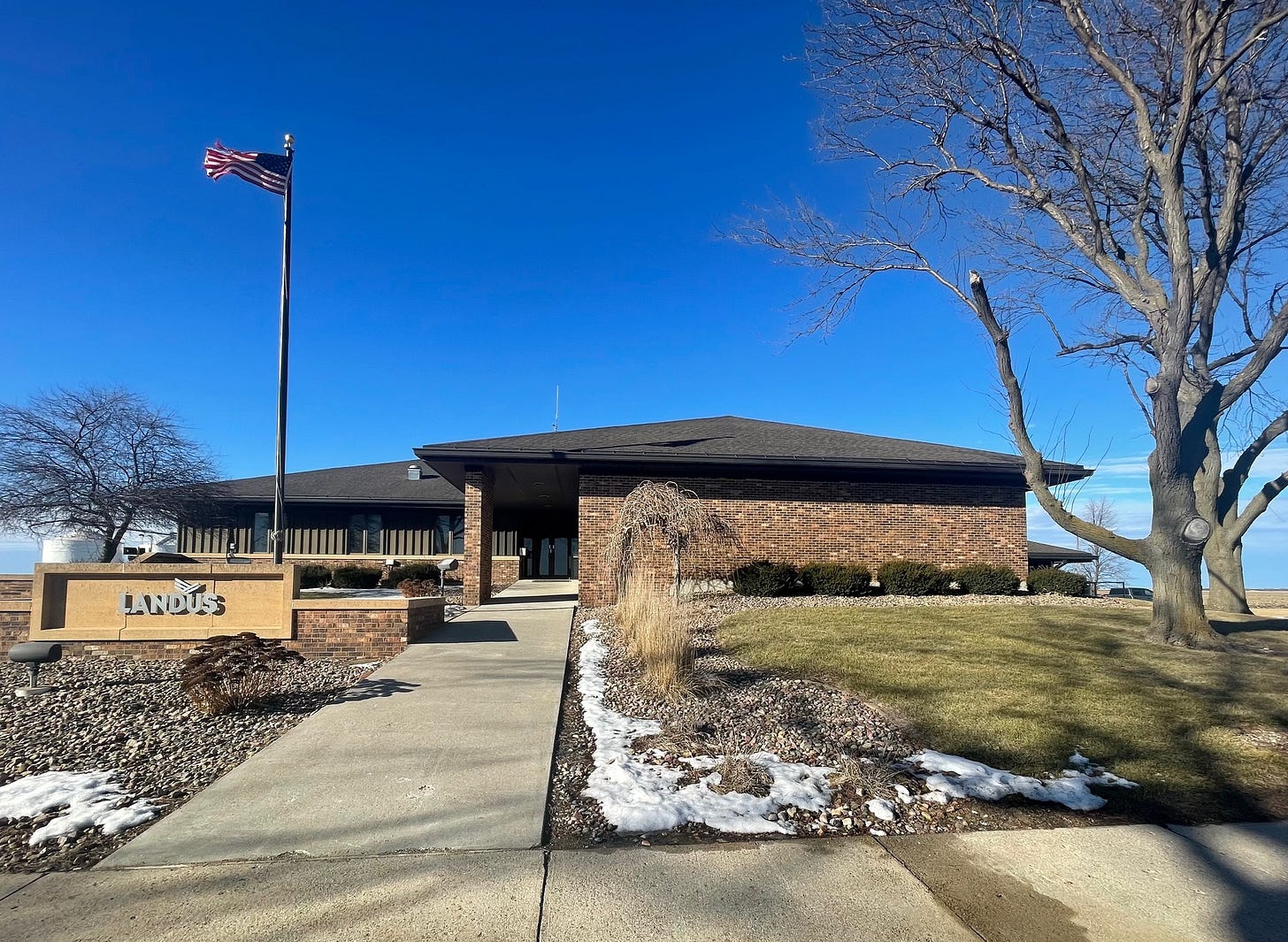
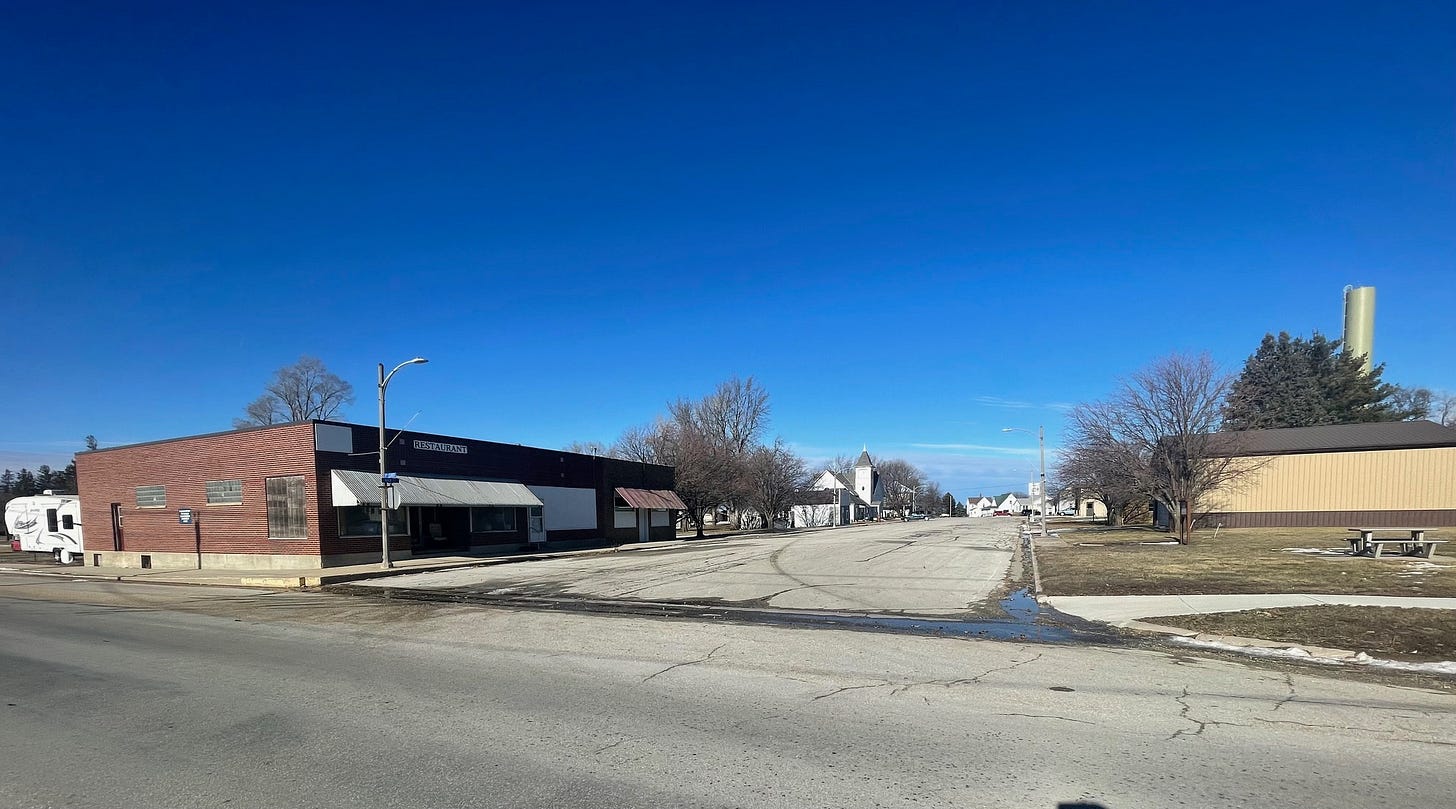
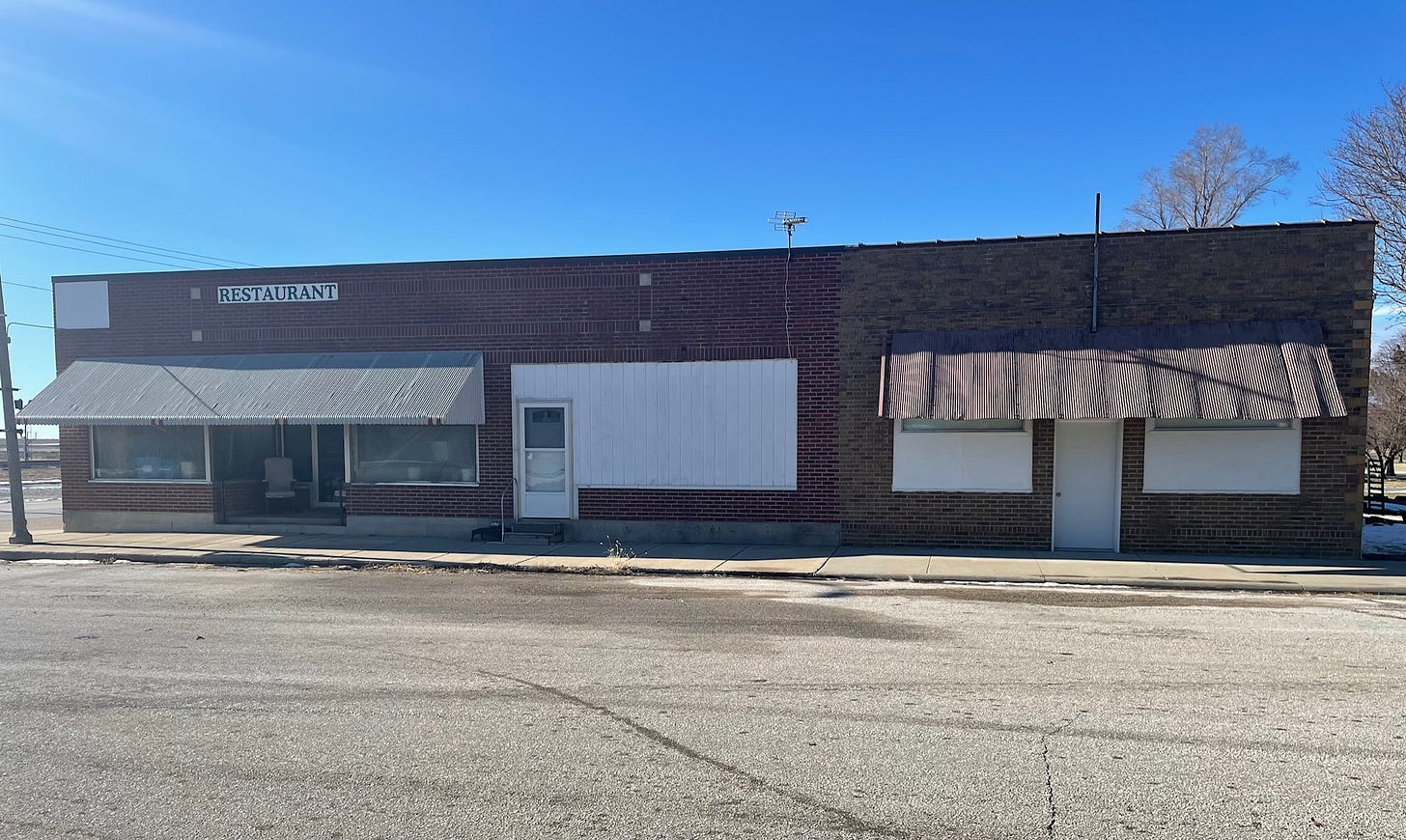
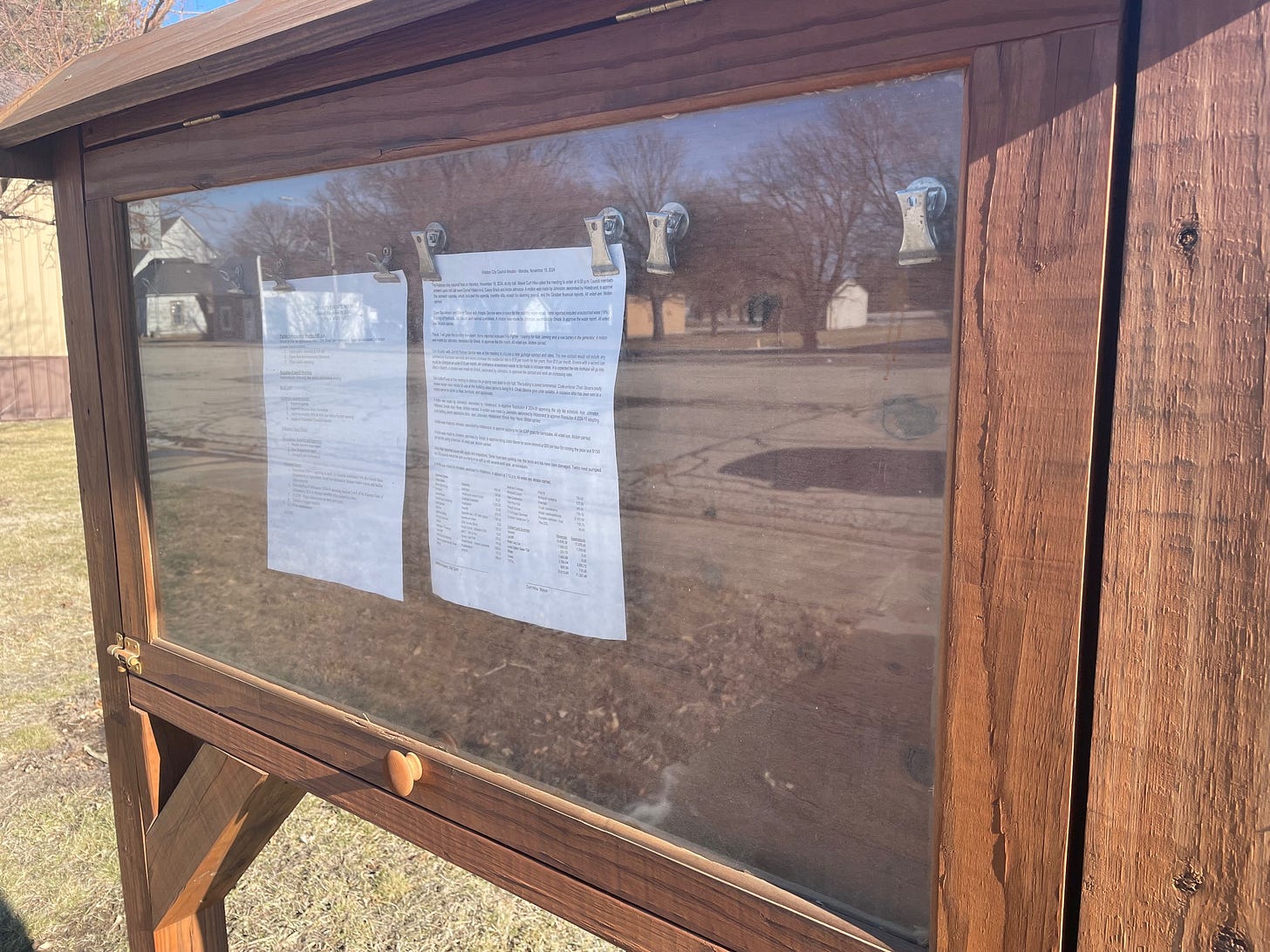
Way to go Chuck. Way to hold their feet to the fire. This is awesome journalism.
Were the fired employees offered severance or outplacement assistance?
And regarding online terminations - so you don’t have to face the music and cut someone’s livelihood with a mouse click?
Well my dad had a word for that. It started with “chicken” and ended with what comes out of the back end of one.
Thank you for standing up for these folks by telling their story.
Ralston is like Lebanon, Iowa, only on a bigger scale. Lebanon in the 60s was easily 55 people. About six today. Oh, and the neighboring farms are mostly husks of their former self--lived on by hired guys and owned by someone distant to the area...and unknown.
And everyone...like about 88%...vote Republican.